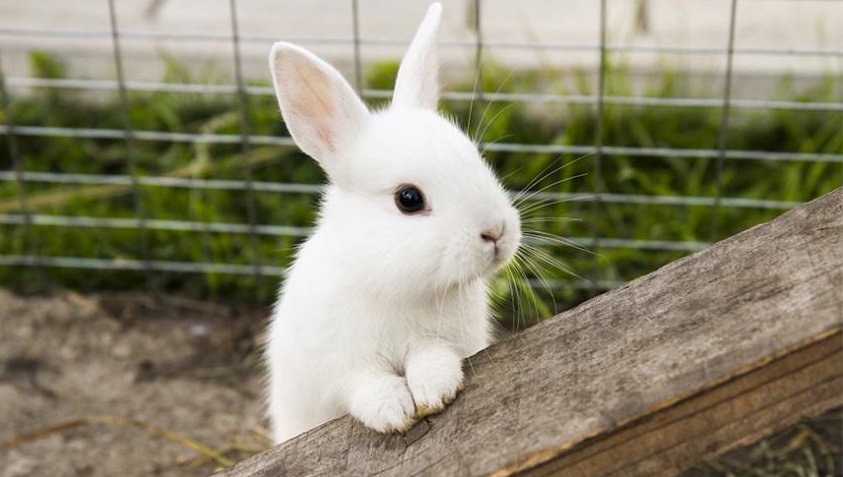Heart disease in rabbits is one of the most difficult diseases to diagnose because of their high heart rate. Normally, a rabbit’s heart rate is in the range of 30-60 minutes. But when they are resting, their heart rate can increase to 140-180 beats per minute.
The problem is, in rabbits who are stressed, their heart rate can reach 300 beats per minute or more than 5 beats per second. Of course this makes the diagnosis of heart disease impossible if only from an irregular heart rhythm and without special equipment.
If this disease remain untreated it can cause heart failure which can be dangerous to the rabbit. As an owner you have to check and maintain their health in order to keep them healthy.
Here are the symptoms of heart disease in rabbits you should know as an owner of rabbit. The following symptoms may not occur in all cases of heart disease in rabbits, they can include:
- Loss of Appetite
Just like humans, rabbits can have “bad days.” However, if your rabbit refuses the fresh food it normally eats or any special food for more than a day, even looking tired and lethargic, then you have to know what should you do when your rabbit loses its appetite. or you can immediately visit the vet, as it could be a sign of something more dangerous.
- Weakness
Any disease including heart disease that causes rabbits to feel weak and discouraged can result in weakness of the hind limbs, which is often mistaken for neurological disease.
For example, rabbits who have heart disease or are anemic, they will not be able to get enough oxygen to their muscle and brain tissue, which can make them look weak, especially after exercising or running. So at least you have to know basic first aid to treat sick rabbits.
- Bloating
Bloating in rabbits is often caused by gastrointestinal bloating which generally occurs due to a blockage in the GI tract, usually in the intestine.
Since rabbits cannot vomit or burp, the most effective and only way to remove food or any object that is swallowed is through the intestines. This also usually happen when your rabbit experienced toxication case, and you should know how to help the rabbit toxication case.
When food is broken down in the stomach, gas and various types of fluids are produced by the rabbit’s body, causing their stomach contents to become more than what they had been digested for the first time.
Therefore if there is a blockage, this continuous process will make the rabbit’s stomach enlarge or swell. In some cases, rabbits’ stomachs can become so large that their entire stomach looks like they have a large balloon inside.
When the stomach is enlarged, the network of blood vessels will be compressed and cause the network of blood supply to become disrupted so that it can cause heart failure and can even threaten his life in a short time. Even because it continues to grow, the rabbit’s stomach can break if not treated immediately. Therefore, you should know this safe treatment for bloating in rabbit.
- Sudden Weight Loss or Gain
Providing an improper diet is one of the causes of loose weight drastically on rabbit, this can also cause the rabbit to become very ill and be at risk of heart disease.
This is due to the role of liver cells being replaced by fat cells, resulting in severe damage to the rabbit’s liver and heart. Then if your rabbit is anorexic or has a sudden loss of appetite for any reason, this condition is a cause for concern and must be treated immediately before heart disease and death become a threat.
- Fast Breathing Rate
There are many different reasons why your rabbit can breathe really fast. Some of that often cause rabbits to experience it are hungry, anxious, fearful, blocked nostrils, and respiratory infections.
You won’t be able to diagnose what condition or disease a rabbit has with rapid breathing, as this can only be done by a veterinarian with a few adequate equipments.
Therefore, if you find this condition in your rabbit, don’t even try to treat it yourself at home, immediately take it to the nearest veterinarian and let them treat it with appropriate measures.
What you have to remember is that all of the above signs and symptoms can indicate some other underlying problems, so you and your rabbit must speak to the vet as soon as possible to make a diagnosis.
Prevent Heart Disease in Rabbits
Unfortunately, heart disease in rabbits is something that can’t be prevented. Treatment and diagnosis as early as possible is the best choice for your rabbit to avoid further problems that are more dangerous, your rabbit’s quality of life can also improve if you are not late.
Early symptoms of heart disease can be detected by routine health checks by veterinarians regularly. During the exam, the vet will examine your rabbit’s overall health, including its heart.
If they suspect your rabbit may have a threatening heart problem, they can immediately arrange for further diagnostic tests to confirm the underlying heart condition as soon as possible.

